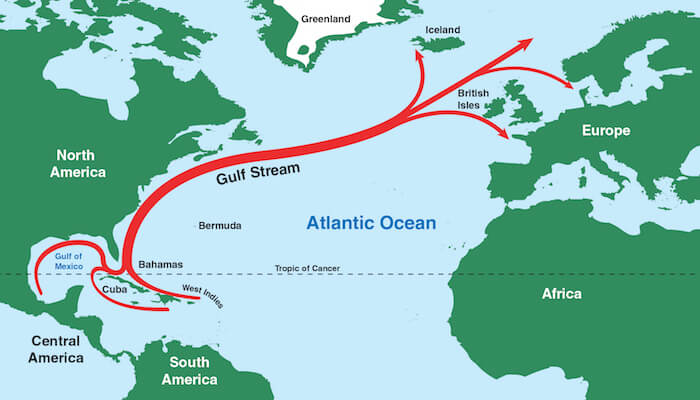The Gulf Stream is weakening and with this unprecedented magnitude the cause is likely anthropogenic, and the implications for life on the East Coast are alarming.
The Gulf Stream (formally known as the Atlantic Meridional Overturning Circulation/AMOC) is a massive, circulating current of ocean water that drives major climate patterns in the Atlantic Ocean region. The water circulation is driven by differences in water densities in the North and South Atlantic; warm surface water from the equator drifts northward towards Iceland where it eventually cools, becomes saltier, and sinks back down to repeat the cycle. This system in combination with the jet stream is responsible for the mild weather in Western Europe and influences climate variability throughout the Atlantic.
Though direct, continuous measurements of the strength of the Gulf Stream have only been collected since 2004, scientists have determined that the system has been slowing down since the 20th century. Many hypothesized that this slowdown had anthropogenic (human-caused) origins, but until recently there was limited research exploring this hypothesis.
A recent study in Nature Geoscience sought to fill this research gap. Researchers from Maynooth University in Ireland and University College London in the United Kingdom used proxy data to reconstruct the historic strength of the Gulf Stream as far back as 400 AD. Proxy data is a type of indirect evidence that informs a scientist about a phenomenon they are interested in. For example, one proxy the researchers in this study used was the size of deep-sea marine sediments; the variable size of the sediments is associated with the strength of the Gulf Stream.
The scientists found that the weakening of the Gulf Stream that has been occurring since the 20th century is unprecedented in recent geologic history and that the last few decades are its weakest period in at least a millennium. The timing and unique nature of the slowdown support what scientists have long hypothesized – it is likely a direct result of human activity. Specifically, global warming is likely driving the change. Melting ice from Greenland and increased rainfall over the Atlantic add fresh water to the system, altering the salinity and ultimately the density that drives the ocean current.
The further destabilization of the Gulf Stream could have profound effects on the global climate. On the East Coast of the United States, for example, one of the study authors Levke Caesar explained, “The northward surface flow of the AMOC leads to a deflection of water masses to the right, away from the US east coast.”
“This is due to Earth’s rotation that diverts moving objects such as currents to the right in the northern hemisphere and to the left in the southern hemisphere. As the current slows down, this effect weakens and more water can pile up at the US east coast, leading to an enhanced sea-level rise.” In addition to sea-level rise, other scientists have predicted more severe storms and hurricanes as a consequence.
An unstable Gulf Stream is bad news for our climate and global ecology. However, the effects could be mitigated by slowing or reversing our current trend of global warming. The unprecedented nature of the Gulf Stream slowdown is further evidence that we must act boldly to confront the climate crisis if we are to maintain a habitable planet for future generations.












This article fails to mention the cooling effect on the North Atlantic European area. The winter storms will likely be more severe.
As the Dome Fuji ice core samples show, every 100,000 years there is a global cool down, likely Initiating in the North Atlantic, resulting in a mile deep glacier, followed by about a 20,000 year interglacial warm up. If/when the Gulf Stream stops,
the glacial cool down will likely be under way. we remain a degree or 2 cooler than the highs of the interglacial warm ups of the past million